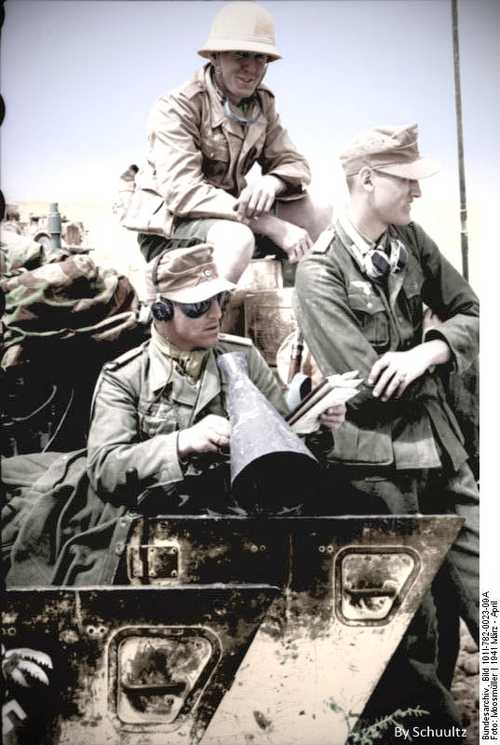
Colorizations By Users
DAK Tankers On A Vehicle col.
Bundesarchiv (Color by Schuultz)
Two German Afrikakorps soldiers rest in their vehicle while an officer attempts to coordinate his unit's movements in North Africa, March/April 1941.
ID: Bundesarchiv Bild 101I-782-0023-09A
____________________________________________
The DAK (Deutsches Afrikakorps) was the German expeditionary force for the North African Campaign and Germany's primary contribution to the Panzer Army Africa, later Deutsch-Italienische Panzerarmee (German-Italian Panzer Army).
The DAK, created by the German High Command as a blocking force to strengthen the back of the Italian Army following the routing of the Italian Tenth Army during Operation Compass, was quickly turned offensive by its commander, Generalleutnant Erwin Rommel. Rommel had already made a name for himself during the Battle of France as commander of the 7. Panzer Division, known as the Gespensterdivision, Ghost Division, for its tendency to seemingly appear out of nowhere when the French did not expect them.
Shocking the British and Allied forces with a series of lightning fast victories early on, Rommel's advance was stopped by the first Battle of El Alamein, July 1942. Following Operation Torch, the successful landing of Allied troops in Morocco, Algeria and Tunesia and the ensuing Two-Front War, the battle for North Africa was lost for the Axis. The remainders of the Panzer Army Africa which could not be evacuated to Italy in time were finally forced to surrender on May 13th, 1943, leaving another 120,000 German troops in war captivity little over a month after the disastrous Battle of Stalingrad.
In the German Press, the Afrikakorps was celebrated more than any other unit of the Wehrmacht, with its perceived clean and courteous campaign against an equally honorable enemy - an attitude represented in its Motto, "Ritterlich im Kriege, wachsam fuer den Frieden" ("Courteous in war, watchful for the peace")
. Rommel soon saw himself stylized as the Hero of the Nation and an officer of the old virtues by the German propaganda. He was even recognized by Winston Churchill during a speech in parliament following the British surrender at Tobruk, though some of the more cynical historians consider Churchill's praises more as an attempted excuse for the poor performance of the British troops early on than as honest sentiments.
Colorized by Schuultz
5851 Views
7/27/2010
